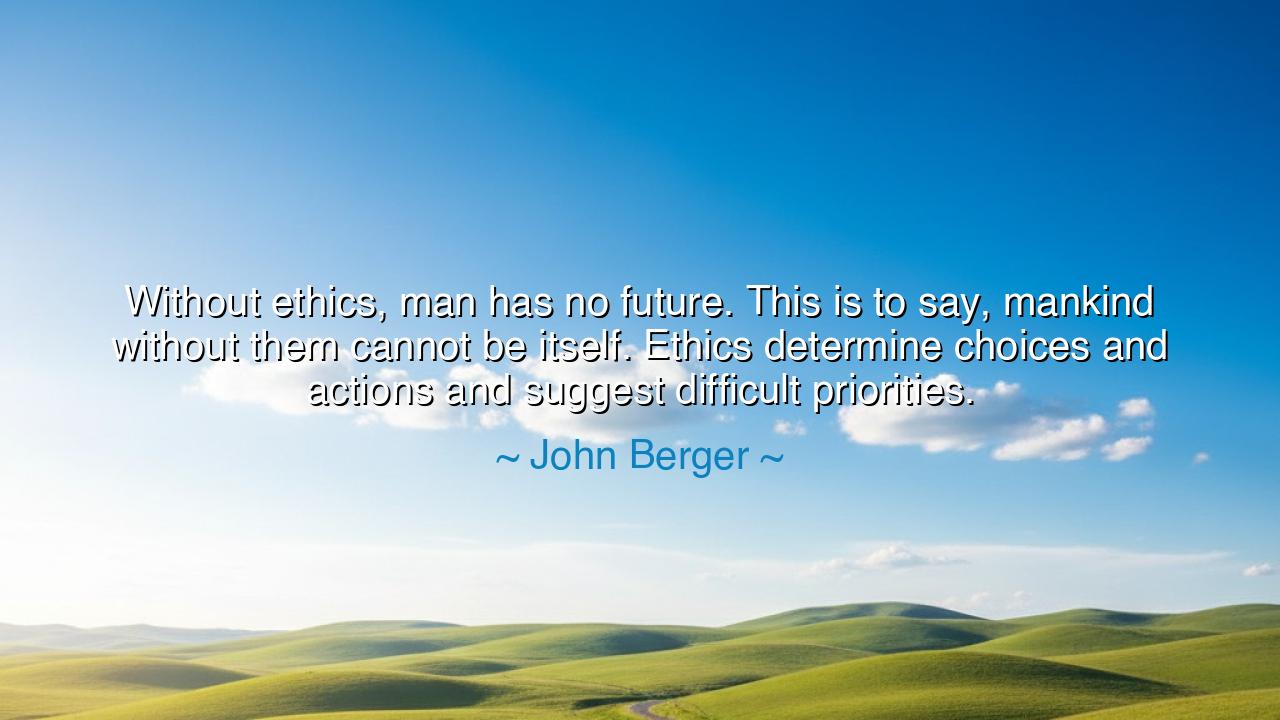
Without ethics, man has no future. This is to say, mankind
Without ethics, man has no future. This is to say, mankind without them cannot be itself. Ethics determine choices and actions and suggest difficult priorities.






In the ebb and flow of human history, the foundation of our societies has often rested upon the delicate balance between right and wrong, between the choices we make and the actions we take. John Berger, in his profound reflection, speaks to the heart of this truth: "Without ethics, man has no future. This is to say, mankind without them cannot be itself. Ethics determine choices and actions and suggest difficult priorities." These words remind us that ethics—the moral compass that guides our decisions—are not mere abstract concepts but the very foundation of humanity’s survival and progress. Without them, we risk losing our way, drifting aimlessly in a world devoid of true purpose.
In the ancient world, philosophers and wise men were not merely concerned with knowledge or power but with the pursuit of virtue and moral clarity. Socrates, one of the most revered of ancient thinkers, spoke often of ethics as the core of human excellence. He taught that without the pursuit of justice, truth, and virtue, life would be without meaning or direction. To live without ethics, in his view, was to live in a state of corruption, for it is through ethical choices that individuals and societies define their purpose. The ethical principles were the very fabric of the ancient Greek polis, shaping not only the individual but the community as a whole. In this way, Berger’s words echo the wisdom of the ancients: that humanity cannot thrive without ethics to guide its actions.
Consider the tale of Alexander the Great, whose conquests extended from Greece to India, changing the course of history. His military genius and vision were unmatched, but it was his ethics—or sometimes the lack thereof—that defined his legacy. Though he sought to unite the world under one empire, his use of violence and excessive power raised questions about his morality. In his attempts to expand his empire, Alexander encountered the challenge of balancing ruthless ambition with the moral responsibility that comes with leadership. His story serves as a reminder that actions driven by selfish desires or lacking moral consideration can often lead to destruction, and that true leadership must be grounded in ethics—in the ability to choose wisely, even when faced with difficult decisions.
The challenge of ethical decision-making is a theme that stretches across history. Consider Mahatma Gandhi, who, through his philosophy of nonviolence and truth, brought a nation to freedom. Gandhi’s moral convictions—his ethics—were the guiding principles that steered the Indian independence movement. Though his approach was not always the easiest or most popular, Gandhi showed that ethical choices, especially those that involve sacrifice, often lead to lasting and profound change. His refusal to compromise on ethical grounds, even when faced with immense pressure from both within and outside his own country, illustrates how ethics provide not only a moral compass but a pathway to enduring legacy.
Berger’s assertion that "ethics determine choices and actions and suggest difficult priorities" invites us to reflect on the choices we face in our own lives. Ethics are not simply rules but are the very lens through which we evaluate the complex and often conflicting demands of life. The priorities we set for ourselves—whether in our careers, relationships, or personal goals—are deeply influenced by our moral framework. When we lack a clear sense of what is right or just, the choices we make can easily lead us astray, leaving us without a clear sense of purpose or direction. Ethics guide us in choosing what is noble over what is easy, what is just over what is expedient, and what is good over what is convenient.
The lesson from John Berger’s words is simple yet profound: without ethics, humanity has no foundation to build upon. Ethics are not mere ideals but practical guides to living a life that reflects our deepest values. Just as Socrates and Gandhi lived by their moral convictions, so too must we cultivate a deep sense of what is right and just. These ethical principles are not just abstract concepts; they must shape our decisions, our actions, and our interactions with others. Without this foundation, we risk losing our way in the face of the challenges and temptations of life.
In your own life, consider the choices you face. Do they align with your moral values? Are they guided by justice, integrity, and compassion? The challenges you encounter will often present difficult decisions, but remember that ethics provide the strength to choose what is right even in the face of hardship. In every action you take, every choice you make, reflect on the deeper ethical truths that will shape your future and the world around you. As Berger reminds us, without ethics, we cannot truly be ourselves, and without them, humanity has no future to look forward to. Let us, then, choose to live by principle, knowing that in doing so, we shape the future of our lives and of the world.






AAdministratorAdministrator
Welcome, honored guests. Please leave a comment, we will respond soon